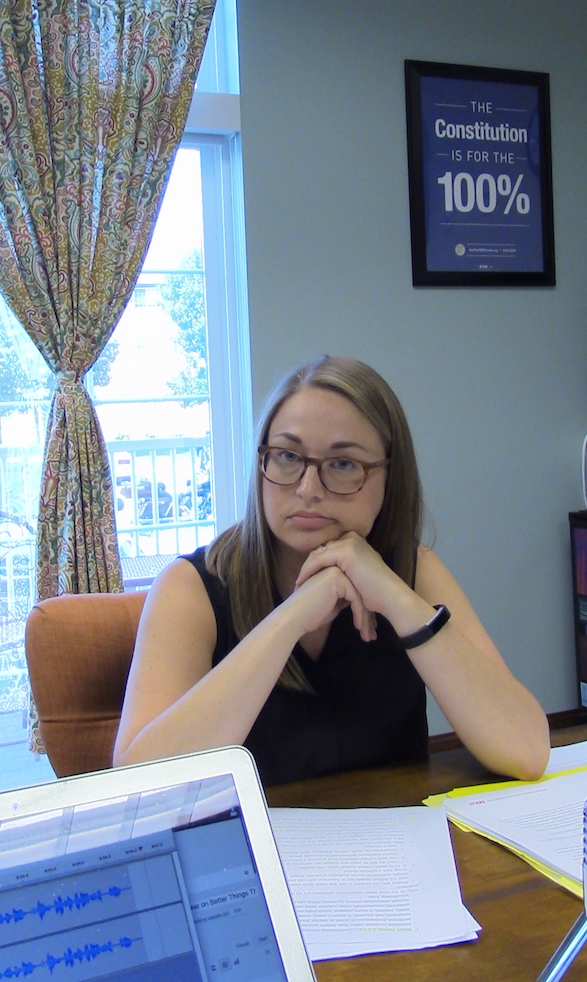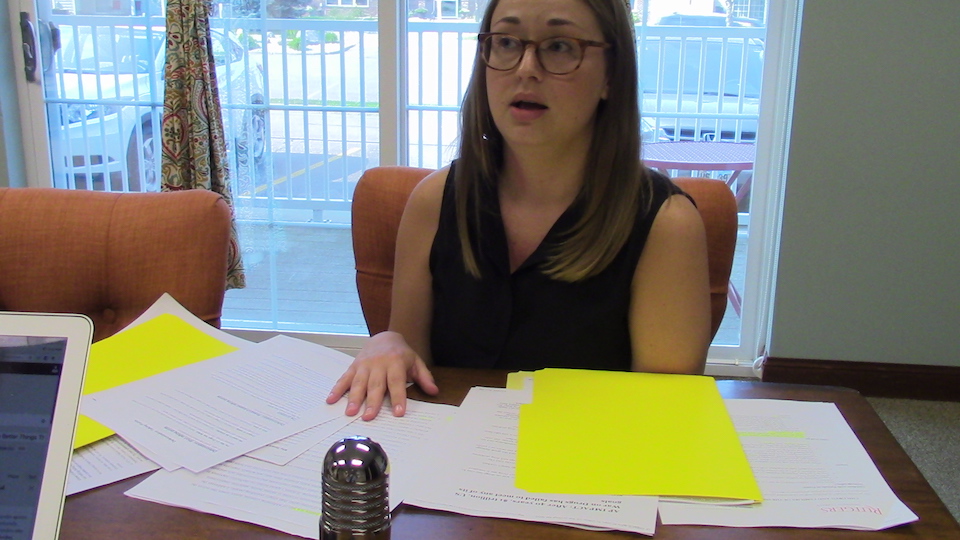
The American Civil Liberties Union of South Dakota has launched its “Smart Justice” campaign this month. John Tsitrian and I have both given the new campaign some blog attention. On Friday, ACLU-SD policy director Libby Skarin (that’s /skreen/, like computer screen, at which Libby surely must look a lot as she collects her vast pile of evidence on public policy), made time to talk with me about the goals of the Smart Justice campaign, which she nutshells as an effort to get citizens and public officials to “address the profound connections of crime to mental health, addiction, employment, education, and housing.”
One of Skarin’s sharpest insights comes early in our conversation, when she notes that while most states tackle crime, especially drug-related crime, with a three-pronged approach of enforcement, treatment, and prevention, South Dakota relies far too heavily on enforcement and doesn’t invest nearly enough in treatment and prevention. Asked why our state has developed a more “punitive” culture, Skarin said that our politicians appear to find it easier to propose “tough-on-crime” enforcement measures because they have an impact right away. We see more miscreants arrested and jailed, run through the courts and thrown in the clink. For politicians focused on the next election, such short-term impacts are great. It takes much longer to see the long-term gains of treatment and prevention, especially the kind of deep, diverse, holistic prevention across social institutions—pre-natal care, good schools, jobs, child care, access to health care, voting rights—that Skarin and the Smart Justice campaign envision.

Skarin also notes (around 10:30) that anti-drug-use moralizing really took off little more than a century ago with religious and, alas, racially tinged rhetoric. Fascinating.
We also get into (around 23:00) how prosecutors could use their broad discretion within current statute to provide smarter justice and what laws we could change (felony penalty for drug ingestion, mandatory minimum sentences) to practice smarter justice in South Dakota.
Here’s the audio of my conversation with ACLU’s Libby Skarin:
Note that the Smart Justice campaign includes a questionnaire for Attorney General candidates, deadline for submission of which was Friday. Skarin said ACLU had received one candidate’s response and was eagerly awaiting the other. Bob Mercer has posted the response from Democratic candidate Randy Seiler; I haven’t heard yet if Republican Jason Ravnsborg has responded. I hope Ravnsborg’s response is in the mail so we can compare how smart he and Seiler are when it comes to justice in South Dakota.
Bjorkman’s study that we’ve both referenced mentions SB 70, which was made law in 2013 after strong bi-partisan support. I’m away from my office, so if you have it handy, check out the section where Bjorkman brings it up. It was supposed to move the system away from imprisonment and toward community-based counseling and rehab programs, apparently funded by money saved by not putting people into the slammer. Bjorkman makes it sound like the whole thing fizzled out and by 2017 we were back to where we started. Here’s the legislative history of SB 70. https://votesmart.org/bill/16122/42481/establishes-alternative-court-programs-for-nonviolent-offenders#.W3CssOhKjIU
Highly informative, compelling and dedicated guest. Great interview questions. Very pertinent topic. It seems that one political party views the ACLU as the enemy when that’s hardly the case.
The ACLU is good for SD and the USA.
Porter, I’m guessing your last line should read in part, “the ACLU [as] the enemy . . . “
Right, Deb. I should proof read better. Bet my grade gets dropped down.
In SD, ‘smart’ justice is nothing more than ‘tough’ justice.
For instance: our record levels of seatbelt violations over the last 5 years might seem smart and/or good to the avg. South Dakotan while it’s really just an effort to be tougher on the avg relatively safe driving citizen.
Being unprecedentedly ‘tough’ on seatbelts is, very wrongly, seen as ‘smart’ policy, as out in Trumpland, smart = tough.
So, how do you inspire these people to appreciate smarter, less costly and simultaneously more compassionate policies? Liken the size of their pea brains to the size of their johnson as they just don’t have the inner courage to TRY to be smarter tomorrow than they were yesterday.
It really does take courage to try to learn something new.
No grades here, Porter! Rather than take the punitive approach, I’ve simply rehabilitated your sentence. :-)
Anyone listening to Skarin in this podcast should understand the ACLU is no American’s enemy; rather, the ACLU is trying to defend and maximize liberty.